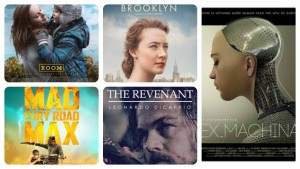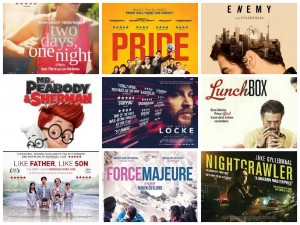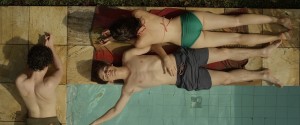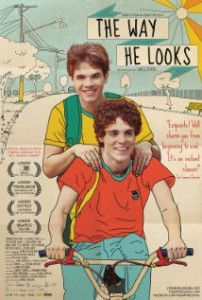
So there we were, in New York City again, giddy and electric with excitement at the start of another Tribeca Film Festival. #tribeca2017 beckoned. Our annual pilgrimage was upon us.
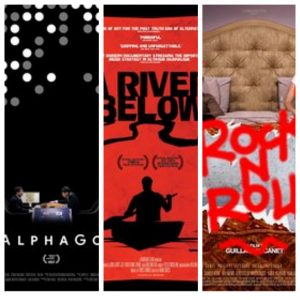
After having set up base at the Battery Park area for the past several years, this year we made home in a tony Chelsea hotel. And a new ritual was set for the film festival. Get up early, get ready and dressed, grab caffeine and sunrise munchies at one of the neighbourhood establishments and head to the Chelsea Bowties cinemas (in the midst of transition to Cinepolis properties) for the 9 AM first press screening. After making agonizing decisions during the rest of the morning regarding which screenings to catch of the several that were concurrently showing, we typically made our way through four films. Then a bite to eat. Or an early dinner at a strongly recommended restaurant (Paowalla, how you filled us up!). Or a meet up with friends. Then a sundown film screening. After which we returned back sated with all manner of cinematic memories bouncing in our heads. And recorded a podcast in which we discussed all the films we had watched cumulatively amongst the three of us. And Joe, the good man, edited and published the podcast the same night.
After five days of this routine, we got bleary-eyed, as the accumulation of ever more films danced around in our brains. But it was the best kind of exhaustion for us, the kind that comes from watching too many films. As if there is such a thing as “too many movies”.

Before we knew it, it was time to head back to the West Coast. With another deposit to our Tribeca Film Festival memory bank. And ready and eager to back for #tribeca2018. And this year, we had seen 34 films amongst the three of us! It is the most films we have covered at Tribeca to date, and hope to best that tally next year.
So herewith is a full listing of all 34 films we covered at #tribeca2017. These films were all discussed on our five ‘live from New York’ podcasts devoted to the festival. But before the full alphabetical listing of the films we covered, here are the top festival favourites from each of us:
Joe’s Top Three Films at the 2017 Tribeca Film Festival
ALPHAGO
A RIVER BELOW
ROCK’N ROLL
Rashmi’s Top Three Films at the 2017 Tribeca Film Festival
GET ME ROGER STONE
ROCK’N ROLL
KING OF PEKING
Yazdi’s Top Three Films from the 2017 Tribeca Film Festival
PERMISSION
PILGRIMAGE
SWEET VIRGINIA
And here is a full alphabetical listing of the films we watched at #Tribeca2017 with links to the Tribeca film descriptions as well as to the specific podcast where each film was discussed:
- A RIVER BELOW, at 24:50 min, Day 3 podcast – Joe’s Top Three Tribeca Pick
- ABUNDANT ACREAGE AVAILABLE, at 11:00 min, Day 1 podcast
- ACORN AND THE FIRESTORM, at 18:57 min, Day 4 podcast
- ALPHAGO, at 29:21 min, Day 2 podcast – Joe’s Top Three Tribeca Pick
- BOMBSHELL: THE HEDY LAMARR STORY , at 29:09 min, Day 4 podcast
- COPWATCH, at 12:14 min, Day 4 podcast
- FLAMES, at 29:44 min, Day 1 podcast
- FLOWER, at 44:01 min, Day 1 podcast
- FRANK SERPICO, at 3:42 min, Day 4 podcast
- GENIUS (television pilot), at 15:58 min, Day 1 podcast
- GET ME ROGER STONE, at 7:45 min, Day 4 podcast– Rashmi’s Top Three Tribeca Pick
- HOLY AIR, at 20:18 min, Day 1 podcast
- HOUSE OF Z, at 30:54 min, Day 3 podcast
- KEEP THE CHANGE, at 36:33 min, Day 1 podcast
- KING OF PEKING, at 25:42 min, Day 1 podcast – Rashmi’s Top Three Tribeca Pick
- LITERALLY, RIGHT BEFORE AARON, at 20:14 min, Day 3 podcast
- MY FRIEND DAHMER, at 8:10 min, Day 2 podcast
- ONE PERCENT MORE HUMID, at 12:13 min, Day 2 podcast
- PERMISSION, at 4:43 min, Day 3 podcast – Yazdi’s Top Three Tribeca Pick
- ROCK’N ROLL, at 44:51 min, Day 3 podcast– Joe’s Top Three Tribeca Pick
- PILGRIMAGE, at 38:53 min, Day 3 podcast – Yazdi’s Top Three Tribeca Pick
- SHADOWMAN, at 23:57 min, Day 2 podcast
- SON OF SOFIA, at 46:25 min, Day 2 podcast
- SWEET VIRGINIA, at 17:31 min, Day 2 podcast – Yazdi’s Top Three Tribeca Pick
- THE BOY DOWNSTAIRS, at 24:24 min, Day 4 podcast
- THE CLAPPER, at 1:50 min, Day 4 podcast
- THE ENDLESS, at 41:09 min, Day 2 podcast
- THE HANDMAID’S TALE (television pilot), at 36:15 min, Day 2 podcast
- THE LAST ANIMALS, at 15:10 min, Day 3 podcast
- THE LOVERS, at 34:57 min, Day 3 podcast
- THIRST STREET, at 2:07 min, Day 2 podcast
- THUMPER, at 6:02 min, Day 1 podcast
- SAMBA, at 2:54 min, Day 1 podcast
- TILT, at 13:05 min, Day 3 podcast

Until next year, goodbye Tribeca!

